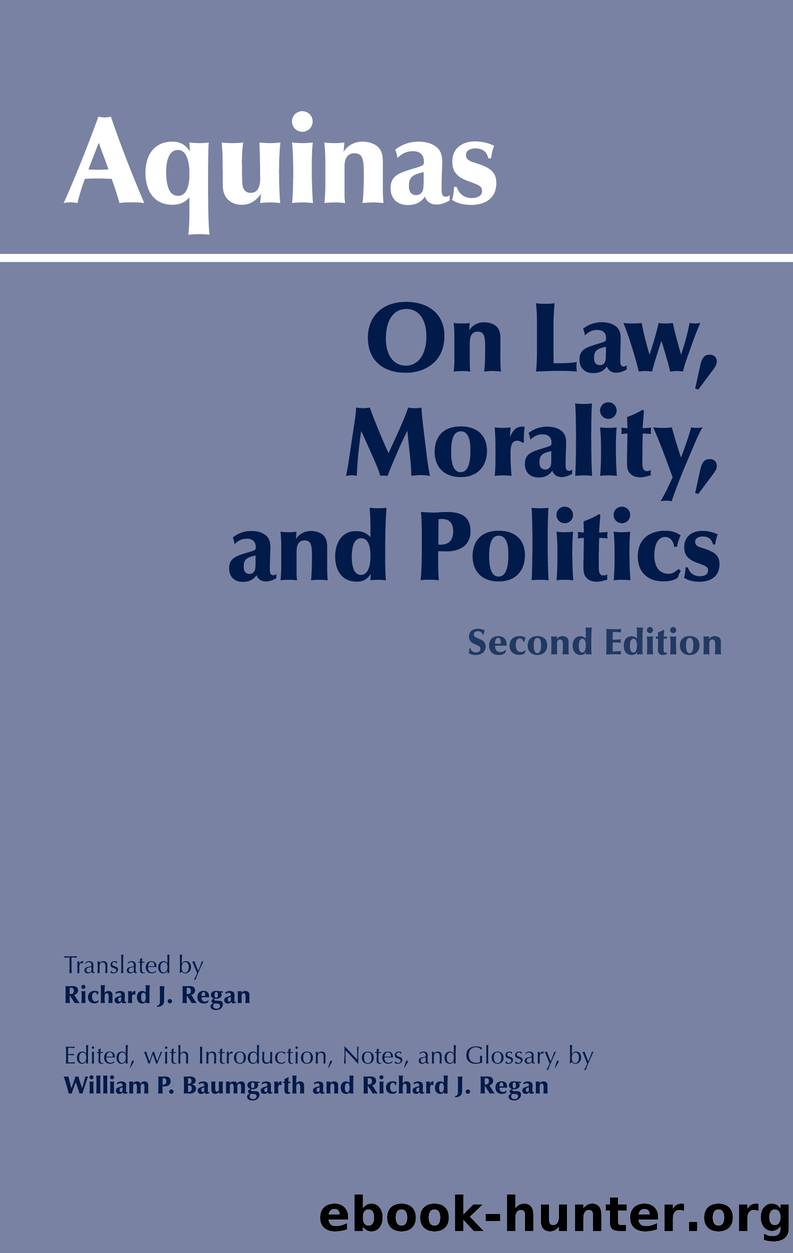On Law, Morality, and Politics by Aquinas

Author:Aquinas
Language: eng
Format: epub
Publisher: Hackett Publishing Company, Inc.
THIRD ARTICLE
Is the Common Right of Peoples [Jus gentium] the Same as Natural Right?
We thus proceed to the third inquiry. It seems that the common right of peoples is the same as natural right, for the following reasons:
Obj. 1. Human beings agree only about things natural to them. But all human beings agree about the common right of peoples, for the Jurist says that âthe common right of peoples is the right that all peoples recognize.â13 Therefore, the common right of peoples is natural right.
Obj. 2. Human slavery is natural, since some human beings are by nature slaves, as the Philosopher says in the Politics.14 But slavery belongs to the common right of peoples, as Isidore says.15 Therefore, the common right of peoples is natural right.
{102} Obj. 3. We divide right into natural right and positive right, as I have said.16 But the common right of peoples is not positive right, since all peoples have never agreed to establish any right by mutual agreement. Therefore, the common right of peoples is natural law.
On the contrary, Isidore says that âright is either natural or proper to a political community or common to all peoples.â17 And so he distinguishes the common right of peoples from natural right.
I answer that, as I have said before,18 right or natural justice consists of things equated or commensurate with other things. And this can be so in two ways. It can happen in one way as we consider things absolutely. For example, men are by their nature commensurate with women in begetting offspring, and parents are commensurate with children in rearing the latter.
Things are by nature commensurate with others in a second way by reason of their consequences, not as we consider them absolutely. For example, dominion over property is such. For if we should consider a particular plot of farmland absolutely, there is no reason why it should belong to one person rather than to another. But if we should consider the plot of farmland with respect to its opportune cultivation and settled use, the land in this respect commensurately belongs to one person rather than another, as the Philosopher makes clear in the Politics.19
And to take possession of something absolutely is proper both to human beings and to other animals. And so the right we call natural in the first way is common to us and to other animals. And the common right of peoples is distinct from the right called natural in the above sense, because, as the Jurist says,20 âThe latter right is common to all animals, the former only to human beings.â But considering things in relation to their consequences belongs to reason. And so the jurist Gaius says: âAll peoples cherish what natural reason establishes with all human beings, and we call such the common right of peoples.â21
Reply Obj. 1. The answer makes clear the reply to obj. 1.
Reply Obj. 2. There is no natural reason, absolutely speaking, why this person rather than that person should be a slave. But
Download
This site does not store any files on its server. We only index and link to content provided by other sites. Please contact the content providers to delete copyright contents if any and email us, we'll remove relevant links or contents immediately.
The remains of the day by Kazuo Ishiguro(7577)
Tools of Titans by Timothy Ferriss(6965)
The Black Swan by Nassim Nicholas Taleb(6204)
Inner Engineering: A Yogi's Guide to Joy by Sadhguru(5910)
Giovanni's Room by James Baldwin(5896)
The Way of Zen by Alan W. Watts(5812)
The Six Wives Of Henry VIII (WOMEN IN HISTORY) by Fraser Antonia(4799)
The Power of Now: A Guide to Spiritual Enlightenment by Eckhart Tolle(4770)
Astrophysics for People in a Hurry by Neil DeGrasse Tyson(4627)
Asking the Right Questions: A Guide to Critical Thinking by M. Neil Browne & Stuart M. Keeley(4599)
12 Rules for Life by Jordan B. Peterson(3746)
The Ethical Slut by Janet W. Hardy(3512)
Skin in the Game by Nassim Nicholas Taleb(3479)
Housekeeping by Marilynne Robinson(3421)
The Art of Happiness by The Dalai Lama(3391)
Double Down (Diary of a Wimpy Kid Book 11) by Jeff Kinney(3285)
Skin in the Game: Hidden Asymmetries in Daily Life by Nassim Nicholas Taleb(3273)
Walking by Henry David Thoreau(3237)
12 Rules for Life: An Antidote to Chaos by Jordan B. Peterson(3209)
